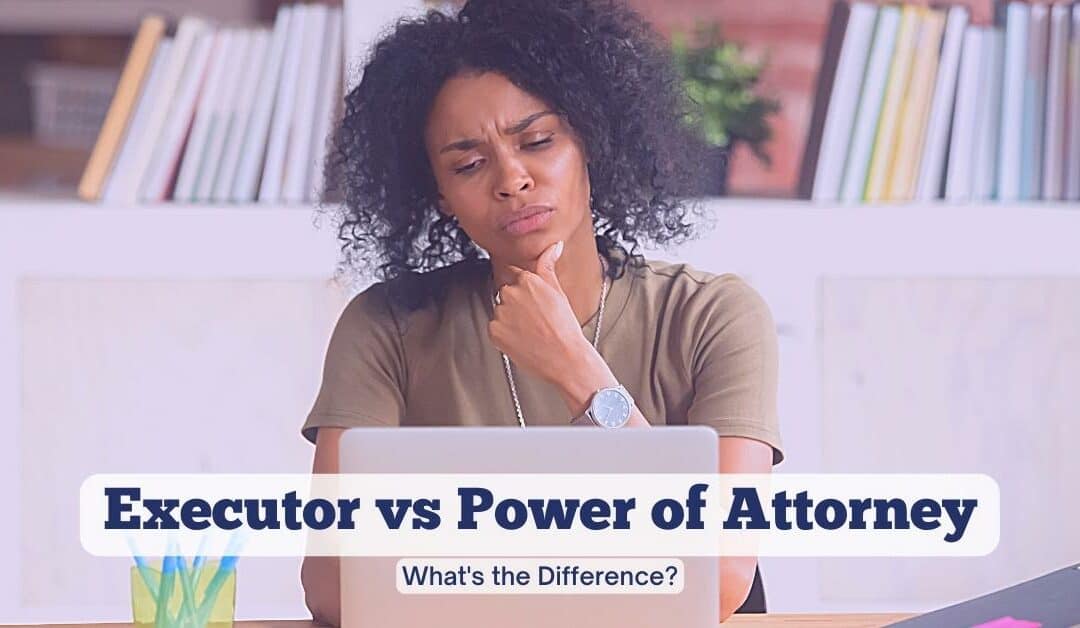When a loved one cannot make their own decisions, they often have a power of attorney agent who makes decisions for them. However, knowing what to do when the person dies is difficult. One of the first things you will do is look at the last will and testament to see if they named an executor. But what is an executor, and what does this role entail? And how does it differ from their power of attorney? Let’s explore the differences between an executor vs power of attorney and help you see how to plan for your future.
What is an Executor?
If you have been named executor of a loved one’s will, you may wonder what that means. An executor is a legal term that refers to the person responsible for handling the deceased’s estate. The executor’s role includes paying debts and distributing assets according to the will. If you are not sure what your role as executor entails, don’t worry! We are here to help clear things up.
As an executor named in the will, you handle the estate. The probate court judge will recognize and work with you to settle it all. An attorney can help you understand what the court expects from you.
In North Carolina, the court will appoint a qualified person to serve if the will does not name an executor. The court will look at the size of the estate, any debts, and who is named in the will to receive assets before deciding.
An executor has several responsibilities, which include:
- Locating and inventorying all assets
- Managing and protecting estate property
- Paying debts and taxes
- Distributing assets to heirs
An estate planning attorney can help you inventory the estate, make your reports to the court, and pay the debts the estate owes.
What is a Power of Attorney?
A power of attorney is a legal document that gives someone else the authority to make decisions on your behalf. This power can be helpful if you are out of town or unable to make decisions for yourself (incapacitated or incompetent).
Your POA agent legally must place your interests ahead of their own. You can give your agent power to:
- Make financial decisions
- Make healthcare decisions, including the ability to consent to giving, withholding, or stopping medical treatments, services, or diagnostic procedures. (Note: your loved one can also make a separate “health care power of attorney” to give only this power to another individual.)
- Recommend a guardian if you become unable to care for yourself.
- Make gifts of money (1)
A power of attorney agent can make financial, medical, or personal decisions for you. There are many types of power of attorney, including:
- Healthcare power of attorney
- Durable general power of attorney
- Springing power of attorney
Your estate planning attorney can help you determine the best type for your situation so that you stay prepared for the future!
Executor vs Power of Attorney: What’s the Difference?
Now that we have looked at the roles of executor and power of attorney, let’s see how they differ.
A power of attorney agent makes decisions for someone while they are living. If they need help making decisions about their finances, personal life, or healthcare, an appointed POA can decide what is best for them and their estate.
However, after someone passes away, the estate executor becomes responsible for the same decisions that the POA was responsible for while the person was living.
The executor steps in and handles all of a deceased person’s estate affairs according to their will. This work includes inventorying the estate, paying debts, and distributing assets to heirs.
So the two roles are very similar in that they both handle someone’s affairs when they cannot do so themselves. In some cases, a POA may also be the estate executor.
Do You Need a POA?
It always makes sense to be prepared for emergencies. If something unexpected happens and you can no longer make decisions for yourself, a POA can make it much easier on your family.
Without a POA, it is sometimes difficult for family members to make tough choices about finances, personal care, or healthcare. When you name a POA, you decide who you trust to make those decisions for you.
Naming an Executor
Everyone over 18 needs a will. If you don’t own much, you can make a simple will. However, your will is crucial because it appoints your executor. The probate court will generally approve your choice.
Naming someone you trust who is responsible with money and has the time and energy to handle your estate is essential.
We Can Help
When you are ready to start planning for your future, contact the experienced estate planning attorneys at Cape Fear Law. We can walk you through how power of attorneys work and which type may help you if you cannot make decisions for yourself. We can also help you create your last will and testament and choose an executor. Don’t wait until it’s too late to plan for the future! Contact us today to get started and find out how we can help!

